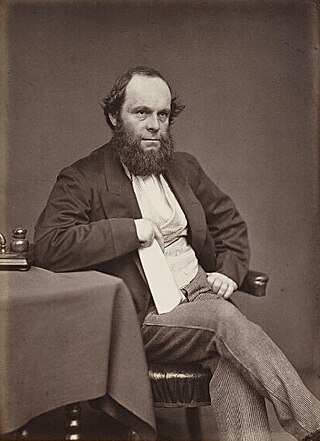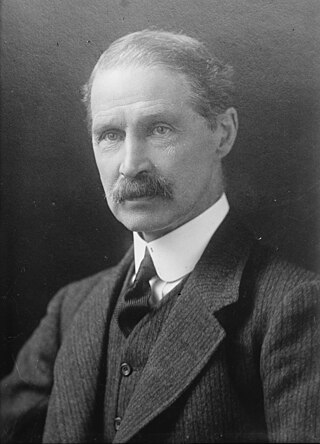
Benjamin Disraeli, 1st Earl of Beaconsfield, was a British statesman, Conservative politician and writer who twice served as Prime Minister of the United Kingdom. He played a central role in the creation of the modern Conservative Party, defining its policies and its broad outreach. Disraeli is remembered for his influential voice in world affairs, his political battles with the Liberal Party leader William Ewart Gladstone, and his one-nation conservatism or "Tory democracy". He made the Conservatives the party most identified with the British Empire and military action to expand it, both of which were popular among British voters. He is the only British Prime Minister to have been born Jewish. He was also a novelist, publishing works of fiction even as Prime Minister.

Stafford Henry Northcote, 1st Earl of Iddesleigh, known as Sir Stafford Northcote, 1st Baronet from 1851 to 1885, was a British Conservative politician. He served as Chancellor of the Exchequer between 1874 and 1880 and as Foreign Secretary between 1885 and 1886

Hugh McCalmont Cairns, 1st Earl Cairns was an Anglo-Irish statesman who served as Lord High Chancellor of Great Britain during the first two ministries of Benjamin Disraeli. He was one of the most prominent Conservative statesmen in the House of Lords during this period of Victorian politics. He served as the seventeenth Chancellor of the University of Dublin between 1867 and 1885.

Gathorne Gathorne-Hardy, 1st Earl of Cranbrook, was a prominent British statesman and Conservative politician. He held cabinet office in every Conservative government between 1858 and 1892, and was a key ally of Benjamin Disraeli.

Michael Edward Hicks Beach, 1st Earl St Aldwyn,, known as Sir Michael Hicks Beach, Bt, from 1854 to 1906 and subsequently as The Viscount St Aldwyn to 1915, was a British Conservative politician. Known as "Black Michael", he notably served as Chancellor of the Exchequer from 1885 to 1886 and again from 1895 to 1902 and also led the Conservative Party in the House of Commons from 1885 to 1886. Due to the length of his service, he was Father of the House from 1901 to 1906, when he took his peerage.

Dudley Francis Stuart Ryder, 3rd Earl of Harrowby, known as Viscount Sandon from 1847 to 1882, was a British peer and politician.

Richard Plantagenet Campbell Temple-Nugent-Brydges-Chandos-Grenville, 3rd Duke of Buckingham and Chandos,, styled Earl Temple until 1839 and Marquess of Chandos from 1839 to 1861, was a British soldier, politician and administrator of the 19th century. He was a close friend and subordinate of Benjamin Disraeli and served as the secretary of state for the colonies from 1867 to 1868 and governor of Madras from 1875 to 1880.

Lord Palmerston, of the Whigs, first formed a government by popular demand in 1855, after the resignation of the Aberdeen Coalition. Initially, the government was a continuation of the previous coalition administration but lost three Peelites within a few weeks. However, other Peelites like The Duke of Argyll and The Viscount Canning remained in office. Palmerston was heavily criticised by Parliament in 1857 over the conduct of the Second Opium War and called a dissolution, but the nation voiced its support in the resulting general election and he returned with a Whig majority.

The Conservative government of the United Kingdom of Great Britain and Ireland that began in 1866 and ended in 1868 was led by Lord Derby in the House of Lords and Benjamin Disraeli in the House of Commons.

The Conservative government under Benjamin Disraeli had been defeated at the 1868 general election, so in December 1868 the victorious William Gladstone formed his first government. He introduced reforms in the British Army, the legal system and the Civil Service, and disestablished the Church of Ireland. In foreign affairs he pursued a peaceful policy. His ministry was defeated in the 1874 election, whereupon Disraeli formed a ministry and Gladstone retired as Leader of the Liberal Party.

The Conservative Government of the United Kingdom that began in 1922 and ended in 1924 consisted of two ministries: the Law ministry and then the first Baldwin ministry.

Stanley Baldwin of the Conservative Party formed the second Baldwin ministry upon his reappointment as Prime Minister of the United Kingdom by King George V after the 1924 general election. His second ministry ended following the so-called "Flapper Election" of May 1929.

The leader of the Conservative Party is the highest position within the United Kingdom's Conservative Party. The current holder of the position is Rishi Sunak, who was elected to the position on 24 October 2022, following his unopposed victory in the party's leadership election.

The second Peel ministry was formed by Sir Robert Peel in the United Kingdom of Great Britain and Ireland in 1841.

After campaigning against the foreign policy of the Beaconsfield ministry, William Gladstone led the Liberal Party to victory in the 1880 general election. The nominal leader of the Party, Lord Hartington, resigned in Gladstone's favour and Gladstone was appointed Prime Minister of the United Kingdom for a second time by Queen Victoria. He pursued a policy of parliamentary reform, but his government became wildly unpopular after the death of General Gordon in 1885. Gladstone was held responsible, and resigned, leaving the way free for the Conservatives under Lord Salisbury to form a government.

Orlando George Charles Bridgeman, 3rd Earl of Bradford, PC, DL, styled Viscount Newport between 1825 and 1865, was a British courtier and Conservative politician. In a ministerial career spanning over thirty years, he notably served as Lord Chamberlain of the Household between 1866 and 1868 and as Master of the Horse between 1874 and 1880 and again between 1885 and 1886.

The Conservative government of the United Kingdom that began in 1957 and ended in 1964 consisted of three ministries: the first Macmillan ministry, second Macmillan ministry, and then the Douglas-Home ministry. They were respectively led by Harold Macmillan and Sir Alec Douglas-Home, who were appointed by Queen Elizabeth II.

The Liberal government of the United Kingdom of Great Britain and Ireland that began in 1905 and ended in 1915 consisted of two ministries: the first led by Henry Campbell-Bannerman and the final three by H. H. Asquith.

The Canningites, led by George Canning and then the Viscount Goderich as First Lord of the Treasury, governed the United Kingdom of Great Britain and Ireland from 1827 until 1828.

Benjamin Disraeli, 1st Earl of Beaconsfield, was the Conservative prime minister of the United Kingdom of Great Britain and Ireland on two occasions, first in 1868 and then between 1874 and 1880.
C. Cook and B. Keith, British Historical Facts 1830–1900




















